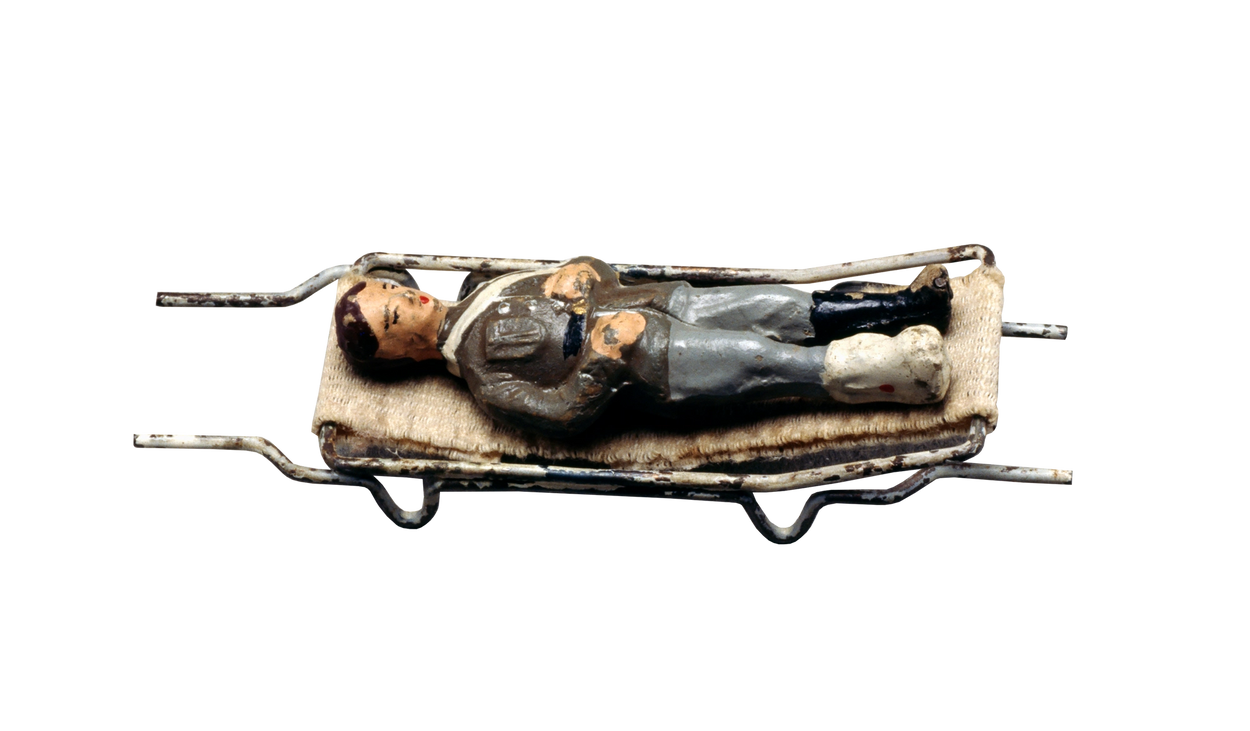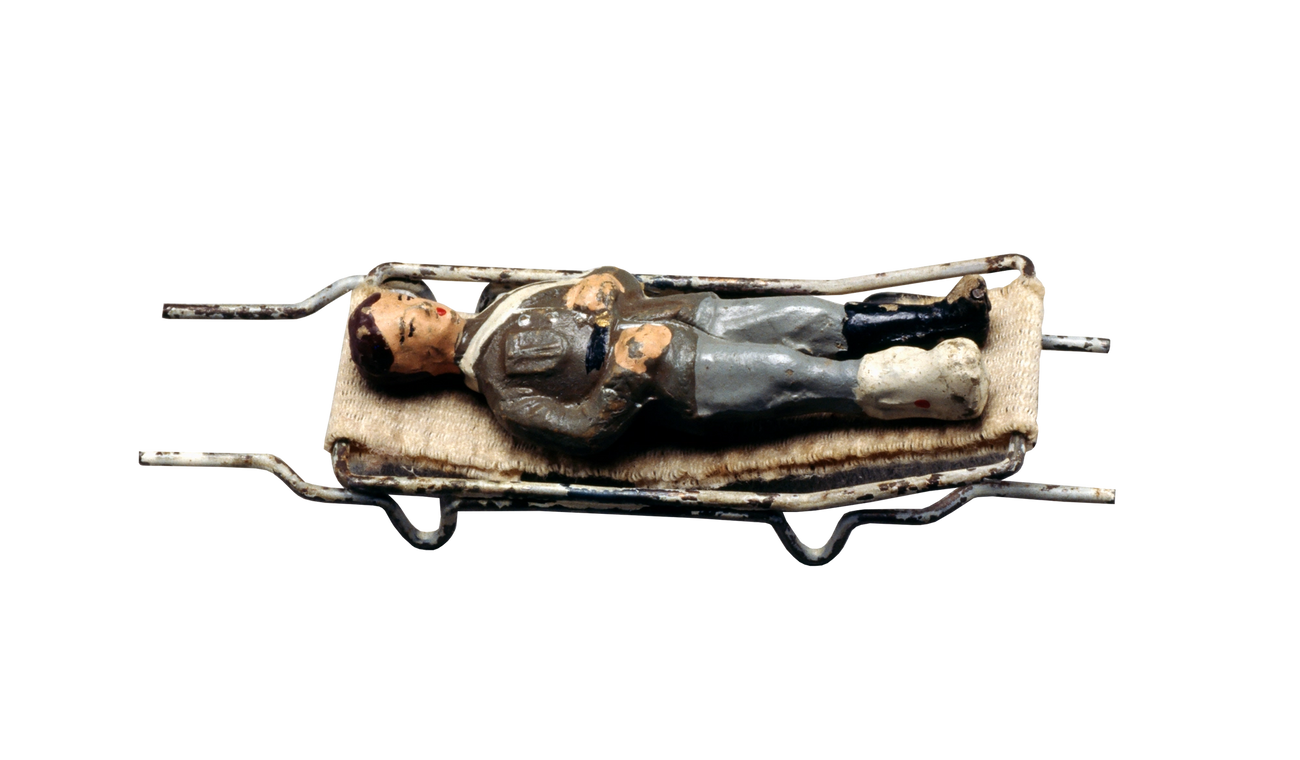When Jewish Children Take to Arms
A Lag Ba’Omer story, newly translated




It happened during the period we called the Tyranny of the Assistants. That year Lag Ba’Omer in Kasrilevke was wet and cold, one of those dreary days that occasionally come at the beginning of May. The sun made a half-hearted appearance, giving light but little warmth. A cold wind, not at all springlike, blew clouds in from afar; the wind snapped at your coattails and swirled underfoot. Just then it struck our assistants’ fancy to take us on a hike beyond the town limits and, as was the custom of Jewish children on Lag Ba’Omer, pack a bagful of goodies and have a field war.
Another age-old tradition was that on Lag Ba’Omer Jewish children took to arms. They packed food for the journey and bedecked themselves from head to toe with wooden swords, popguns, and bows and arrows. Then they went out into the open field for mock battle. All year long the Jewish children, poor souls, were cooped up in a dark kheder, bearing the yoke of Torah studies, standing in dread of the rabbi and in awe of the assistants’ whips. But on Lag Ba’Omer they left for the field of battle, fully armed. They imagined they were heroes who could take on the most ferocious foe and conquer the world. Suddenly infused with courage, they took giant strides and sang rhymes like:
One, two, three, four,
We study Torah more.
Hear O Israel, have no fear,
Because our God the Lord is near.
We children maintained our old custom. We brought down from the attic last year’s wooden swords. We strung bows with the metal bands from the Passover wine barrels. The assistants provided us with popguns—for a fee, of course. They were so skillfully made they could actually shoot a fly, if only the fly would sit still and wait for us to fire. We also had other weapons, Jewish weapons that could only scare infants to death. Our food supply was no trifle either. Everyone brought what God had blessed him with and what his mother had generously provided.
On Lag Ba’Omer we came to kheder armed from head to toe, our pockets stuffed with all sorts of treats: khalle and biscuits, goose fat and eggs, whiskey and cherry brandy, chicken legs and hunks of duck, gizzards and livers, sweetened tea, nuts, oranges, and jams, as well as some kopecks in cash. Each of us wanted to outdo everyone else and bring the most of the best treats and get in good with the assistants. The assistants showered us with praise, declared we were topnotch lads, and swept our goodies into their sacks. They lined us up like troops and ordered:
“Hold hands, Jewish children, and march across the bridge to the meadow to meet the Otters and wage war with them.”
“Hurray, the Otters,” we all cried in unison. We joined hands and swiftly went forward, with the pride and confidence of true heroes.
We called the young primer pupils Otters because they were little tots, just learning the aleph-beys. To those of us already studying the Torah these little kids looked like flies or ants. We fancied that we could demolish them with one huff. We felt certain that the minute they saw us armed from head to toe with swords, bows and arrows and popguns, they would surely kick up their heels and run for the hills. Stout warriors like we Torah students could not be dismissed lightly. We had the tiny primer tots scared to death; they were afraid of even setting foot within sight of us. We Torah students were nothing to trifle with.
Actually, we had never fought the Otters. But we were convinced that with one glance we would make rack and ruin of these little pipsqueaks and finish them off. In addition to making short shrift of them, we would take the spoils of war. We would split up all their treats—and let them go sue us.
Because of our stout hearts and great confidence in our own strength, we pushed one another forward and slapped one another’s shoulders and backs, while the assistants urged us from behind to quicken our pace.
“Why’re you crawling like bedbugs?” they asked. Yet they themselves frequently stopped to unpack their bags. They tasted the various goodies and praised our treats and cherry brandy.
“Excellent brandy,” they said, passing the bottle around, guzzling—glub, glub—in great big gulps straight from the neck of the bottle. “Good stuff! Top notch liquor!”
The assistants licked their fingers and lagged behind us, motioning to us from the distance to keep moving. Ever onward.
Although the wind grew sharper, we went further and further into the big meadow. Clouds darkened the sky, and a cold, heavy rain lashed our faces. Our hands swelled and turned blue with cold. Our soaked boots squished in the mud. We had already stopped singing. We were tired and hungry—starved, in fact. We decided to sit down and rest and grab a bite to eat.
“Where are the assistants?” one of us asked.
“The hell with them! It’s the food we want! Where’s the food?”
And the gang began to mutter complaints against the assistants.
“They have some nerve nabbing our gizzards and livers, biscuits and eggs, our bit of cherry brandy, and our few kopecks. The nerve of them, leaving us stranded here in the cold, in the deserted meadow, dead hungry. To hell with the assistants!”
“May they drop dead in their boots!”
“The plague strike all the assistants in the world!”
“May God get even with them!”
“Shh! Pipe down! Here comes our enemy! Here comes the foe!”
“Little pipsqueaks with big sticks.”
“The Otters. The Otters.”
“Hurray! Here come the Otters!”
As soon as we spotted them, we let loose like hunger-maddened wolves, ready to trample them and tear them to pieces. However, tragedy struck. An awful tragedy, which no one could have foreseen. If something is not destined to be, neither wit, strength, nor skill are of any avail. Just listen to what happened.
Although the Otters were midget-sized pipsqueaks just learning the aleph-beys, they were evidently no fools. Before they met us in the big meadow to do battle, they had prepared themselves by training at home. Then they filled their bellies, stuffed their guts, took along warm clothing and rubber galoshes, and armed themselves from head to toe no worse than us, perhaps even better. They too had swords, bows and arrows, and popguns. They didn’t wait for our offensive but attacked us first and began to break our bones. They bustled in on all sides so quickly we didn’t even have a chance to look around and see what we were doing. We didn’t notice at first that they weren’t alone but were accompanied by their assistants, who incited them with cries of:
“Get even with those Torah lads. Clobber those long-legged louts.”
Naturally, we didn’t take this lying down. Like heroes, we faced the little pipsqueaks, slashing them with our swords; we drew our bows and aimed our popguns at them. But, alack and alas, our swords were as blunt as wood. By the time we made a move with our bows and arrows, we were already on the defensive. I won’t even talk about the popguns! What good were popguns if the enemy refused to wait until he was popped, but dashed toward you and, while you stood helplessly by, knocked the popguns out of your hands?
A bad fix! So we chucked away all our weapons—swords, bows and arrows and popguns—and began to fight the way God intended us to fight. That is, we entered the fray with our hands and our fists. The only trouble was that we were tired, hungry, and frozen. We fought with no order, no plan, and no leader, for our assistants had remained behind. They were in their cups, blast them, soused from our bit of cherry brandy. And with ever-increasing strength, the little pipsqueaks, warmly dressed and stuffed to the gills, swarmed all over us from three sides. They beleaguered us with blows, slaps, and punches. The very same punches which we planned to dole out to them, they doled out to us. And their assistants were in the lead and never ceased inciting them.
“Get even with these Torah lads! Punch ’em! Beat ’em! Get those long-legged louts.”
It’s hard to determine who first turned tail to the enemy. I only know that we ran home helter-skelter with all our might, right back to Kasrilevke. And the little pipsqueaks, damn them, ran hot on our necks after us, hooting and jeering and laughing at us behind our backs:
“Down with the Torah lads! Down with the long-legged louts!”
We came home tired, hungry, sleepy, tattered, beaten, licked, whipped, done for. We heroes figured that our parents would surely have pity on us and offer us some honey cake to ease the pain of our blows. But it turned out that we had been deluding ourselves. They hadn’t even given us a thought. Thank God, we all escaped without a whipping for our torn jackets and ruined boots. But the next morning the rabbi, Reb Nissel the Short, gave it to us for the bruises on our foreheads and the blue rings beneath our eyes. We were taken and—we’re ashamed to admit—lain face down, one by one, and whammed where we ought to be whammed. In other words, if you didn’t have enough, here’s some dessert for you.
But our assistants—may all trace of them perish from the earth!—distressed us most of all. When parents punish a child, they do it perhaps out of a sense of duty. When a rebbe lays you down and whips you—well, that’s what he’s a rebbe for, and that’s what the whip is for. But the assistants, blast them! Not enough that they glutted down all our treats, may the worms glut them down, dear God! Not enough that they left us alone to the mercy of God in the middle of the meadow, but during the whippings these assistants even held our legs to prevent us from kicking and squirming around.
And that’s how our Lag Ba’Omer festivities ended, a holiday dark, gloomy, and ruined.
Translated from the Yiddish by Curt Leviant
Sholem Aleichem, (Shalom Rabinovitz; 1859–1916), is one of the founding fathers of modern Yiddish literature.